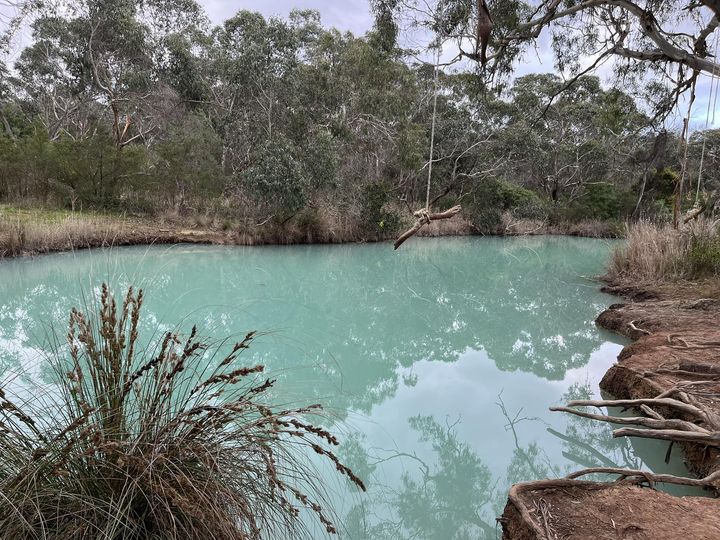The Anglesea River has changed colour to a what locals describe as an unhealthy milky-jade and it’s got them concerned.
Acidic inflows mixing with sea water is being blamed and Friends of Anglesea River (FOAR) member Keith Shipton says historically – when the river changes colour – fish kills are likely.
“But this time no, because there’s no fish in the river,” he said.
“Even though the river has been pH neutral for almost a year, we still haven’t had any fish come back.”
The rivers traditional name for the Wadawurrung people is Kuarka Dorla, meaning place to catch Mullet, but the troubled estuary has largely been without fish for almost four years.
There was a brief window beginning late last year when heavy rains blew out the sand berm that typically seals the river off from the ocean. During this period fish swum swum in and were being caught for the first time in years, but that appears to have ended.
The Corangamite Catchment Management Authority (CCMA) released results of a fish survey in the waterway in February this year, that revealed the presence of four fish; Black bream, Smooth toadfish, Yellow-eyed mullet and Australian Salmon.
But Mr Shipton says the CCMA have been reluctant to carry out another survey since.
“I can only conclude that’s because they don’t want to know what the results are going to be,” he said.
The FOAR group now has around 600 members, which as Mr Shipton points out is in a town that has 3,200 residents according to the 2021 census. They’re becoming increasingly vocal about the response from local and state authorities to the continuing poor health of the waterway, where naturally occurring soil acidity is believed to be a key culprit.
“Their concern is to a certain extent driven by public opinion.
“We are going to continue pushing the issue until we get our fish back in the river.”
Why the acidity is now so bad that the water is unable to sustain aquatic life, and for how long historically the issue has occurred, is a debated point.
“We feel that the fundamental cause of the problems of the river are the 50-odd years of pumping from the aquifer immediately below the catchment by Alcoa to run its coal mine and power station,” Mr Shipton said.

“That stopped in 2016, but the damage has been done.”
It’s a hypothesis backed up by Melbourne University Prof. Ralf Haese from School of Geography, Earth and Atmospheric Sciences, who last year produced a paper that claimed Alcoa’s decades of pumping groundwater has negatively affected water quality in the Anglesea River and estuary.
“Groundwater extraction as part of the mining and power plant operation has lowered the groundwater level far beyond the mine..and has negatively impacted the water quality in the Anglesea River,” Prof. Haese said at the time.
The theory is that a lowering of the aquifer has led to a drying of the river and associated estuary where naturally acidic soils occur, and now when it rains that acidity flows into the river.
Alcoa denies there’s a link, the state government is yet to provide a response to the paper.
As Alcoa continues to remediate its former mine site it is looking for a new water licence to allow it to continue pumping water there, but this time into its old coal pit to create a ‘water body’.
The Surf Coast Shire Council has backed in FOAR and Prof. Haese, and formally opposes the application which the company says it is still pursuing.
The latest visual decline in the rivers health has again prompted calls for a precautionary principle to be applied to its conservation and management, and for Alcoa’s application to to pump more water to be ruled out.
“We need them to stop pumping from the aquifer permanently, because nothing good can happen until it gets back into equilibrium – which it will over time, but that could be over quite a long time,” Mr Shipton said.








